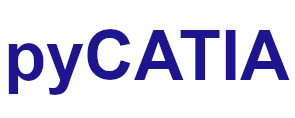pycatia.knowledge_interfaces.optimizations¶
Module initially auto generated using V5Automation files from CATIA V5 R28 on 2020-06-11 12:40:47.360445
Warning
The notes denoted “CAA V5 Visual Basic Help” are to be used as reference only. They are there as a guide as to how the visual basic / catscript functions work and thus help debugging in pycatia.
- class pycatia.knowledge_interfaces.optimizations.Optimizations(com_object)¶
Note
CAA V5 Visual Basic Help (2020-06-11 12:40:47.360445)
System.IUnknownSystem.IDispatchSystem.CATBaseUnknownSystem.CATBaseDispatchSystem.CollectionOptimizationsRepresents a collection of optimization features.See also:Optimization- create_constraints_satisfaction(i_name: str, i_comment: str, i_formula_body: str) SetOfEquation¶
Note
- CAA V5 Visual Basic Help (2020-06-11 12:40:47.360445))
- o Func CreateConstraintsSatisfaction(CATBSTR iName,CATBSTR iComment,CATBSTR iFormulaBody) As SetOfEquationReturns a set of equations.Parameters:iNameThe name of the set of equations.iCommentThe comment of the set of equations.iFormulaBodyThe body of the set of equations “ a==b+4; c ≤90”.
- Parameters:
i_name (str) –
i_comment (str) –
i_formula_body (str) –
- Return type:
- create_optimization() Optimization¶
Note
- CAA V5 Visual Basic Help (2020-06-11 12:40:47.360445))
- o Func CreateOptimization() As OptimizationCreates an empty optimization.This optimization cannot be used while its properties have not been set.
- Return type:
- item(i_index: cat_variant) AnyObject¶
Note
- CAA V5 Visual Basic Help (2020-06-11 12:40:47.360445))
- o Func Item(CATVariant iIndex) As AnyObjectRetrieves an optimization using its index or its name from theOptimizations collection.Parameters:iIndexThe index or the name of the item (optimization orconstraintSatisfaction) to retrieve from the collection of optimizations. As anumerics, this index is the rank of the item in the collection. The index ofthe first item in the collection is 1, and the index of the last item is Count.As a string, it is the name you assigned to the item using theAnyObject.Name property or when changing the item name by the propertypanel.Returns:either the retrieved optimization or the retreivedconstraintSatisfactionExample:This example retrieves the last item (optimization orconstraintSatisfaction) in the optimizationscollection.Set lastItem = optimizations.Item(optimizations.Count)
- Parameters:
i_index (cat_variant) –
- Return type:
